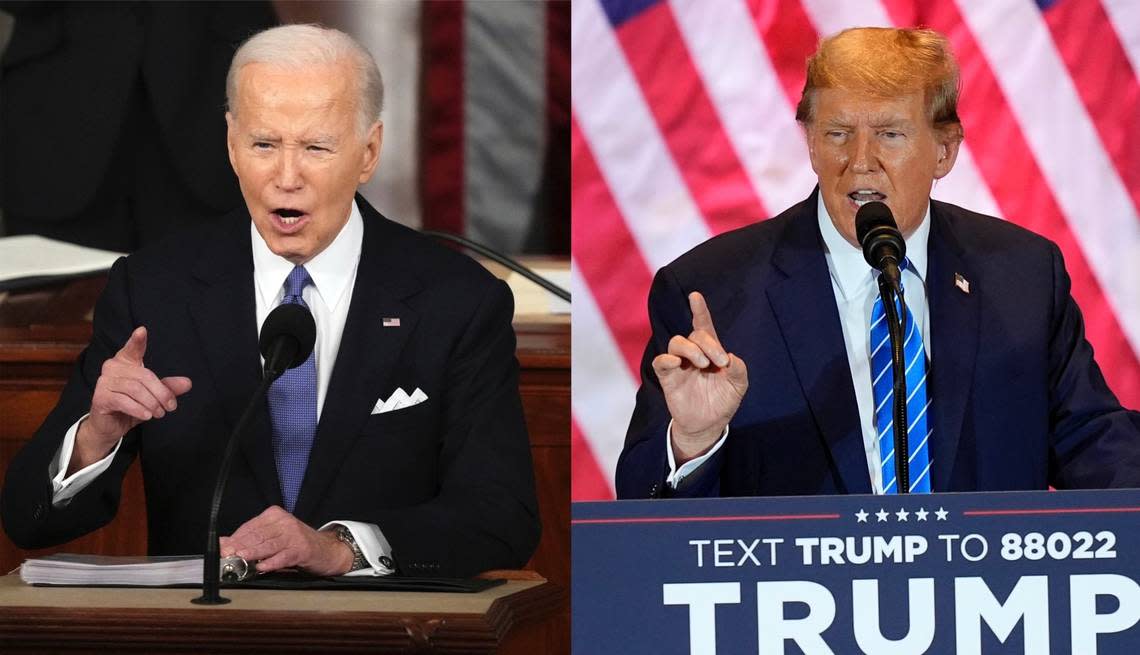Biden and Trump face high levels of dissatisfaction in their parties. Does it matter?

- Oops!Something went wrong.Please try again later.
- Oops!Something went wrong.Please try again later.
While President Joe Biden and former President Donald Trump emerged victorious from Super Tuesday, winning nearly all of their respective primaries, both faced substantial pockets of discontent within their parties.
In a potentially worrying sign for Biden, significant minorities of Democratic voters in multiple states cast their ballots for “uncommitted” or similar options.
Similarly concerning for Trump, sizable numbers of GOP voters in a string of states signaled their hesitancy to vote for him in the general election.
These wary voters could spell trouble for the candidates come November, particularly since the race is forecast to come down to such a small number of voters in less than a dozen swing states, elections experts told McClatchy News.
The results are “comparably concerning for both candidates, who both are viewed comparably unfavorably,” Robert Shapiro, a political science professor at Columbia University, told McClatchy News.
Biden and the ‘uncommitted’
While Biden easily won every Super Tuesday Democratic primary with the exception of American Samoa, he was met with small, but consistent, clusters of disapproval.
He faced his strongest opposition in Minnesota, where nearly one in five (19%) Democratic primary voters voted for the “uncommitted” option.
Similarly, 12.7% of Democratic voters in North Carolina opted for “no preference,” while 9% of Massachusetts’ Democratic voters did the same. Eight percent of Colorado’s Democratic primary voters cast their ballots for “noncommitted delegate,” and 7.9% of Tennessee’s Democratic voters chose “uncommitted.”
The results come on the heels of Michigan’s Democratic primary in which a brief but organized protest effort resulted in over 100,000 voters, making up 13% of the total vote, selecting “uncommitted.”
“Such pockets of discontent should be worrying for the Biden campaign, even at this very early point in the general election campaign,” Paul Beck, an emeritus professor of political science at the Ohio State University, told McClatchy News.
The votes against Biden can be seen as manifestations of policy disagreements, many of them over America’s support of Israel in its war in Gaza, which has left tens of thousands of Palestinians dead and led South Africa to file a genocide charge at the International Criminal Court, Beck said.
While these dissatisfied Democratic voters may be unlikely to vote for Trump, they might sit out the election or choose to vote for a third-party candidate, Shapiro said.
These non-Biden votes could be detrimental to the president’s re-election effort, particularly in highly contested states like Michigan and North Carolina.
Trump and hesitant GOP voters
The former president romped to victory in every Super Tuesday Republican primary with the exception of Vermont, which went for Nikki Haley.
However, recent polls reveal he faces an uphill battle in convincing large minorities of GOP voters to move back into his camp.
More than three-quarters of Haley voters in North Carolina, 78%, told exit pollsters they were unwilling to support the party’s nominee, whoever it may be, according to ABC News. Sixty-nine percent of Haley voters in California and 68% in Virginia said the same.
Large minorities of GOP voters in these states — including 37% in Virginia and 31% in North Carolina — also said they would not consider Trump fit to be president if he ends up being convicted of a crime, per Politico.
Additionally, in New Hampshire, over one-third of Republican voters, 34%, said they were so dissatisfied with Trump that they would not vote for him in November, according to a March Associated Press poll. A quarter of South Carolina GOP voters and 20% of Iowa Republican voters said the same.
“These are danger signs for Trump that could affect the outcome in contested states against Biden,” Shapiro said. “He lost the 2020 election by not more than 40,000 votes in 3 states, so these defections from normally Republican supporting voters, could hurt him.”
“I think Trump has more to worry about with (roughly) 20-30% voting for Haley and not him,” Beck said. “In the face of Trump’s sure nomination, these voters are likely saying they will not vote for Trump in the general.”
Will non-committed voters come around?
Despite the brewing discontent with Biden and Trump in their respective parties, it’s likely that many uncommitted voters will come home to the pair — who are all but assured to face a rematch — by November, experts said.
“In past years, dissenters usually end up returning to their party’s candidate in the general election,” Beck said.
For Democratic voters concerned about Israel’s military campaign in Gaza, more forceful rhetoric opposing Israel’s actions from the White House could motivate them to return to Biden, he said.
However, Beck said, “We need to be reminded that it is very early in the general election campaign. Lots can happen between now and the fall.”
With Trump in his late 70s and Biden in his early 80s, it’s possible that changes in their health could affect the race’s dynamics, Beck said.
Already, majorities of voters have said that both men are too old to serve as president again, according to a February Ipsos poll.
Similarly, it’s possible that Trump may be convicted in one or more of the four federal cases against him before the election, which, polls have shown, could move a significant number of voters against him.
Who do voters want as Trump’s vice president? Poll reveals some surprising choices
Can musicians force Trump to stop using their songs? It’s complicated, legal experts say
Biden’s doctor calls him ‘fit for duty.’ But are exams reliable? What historians say

